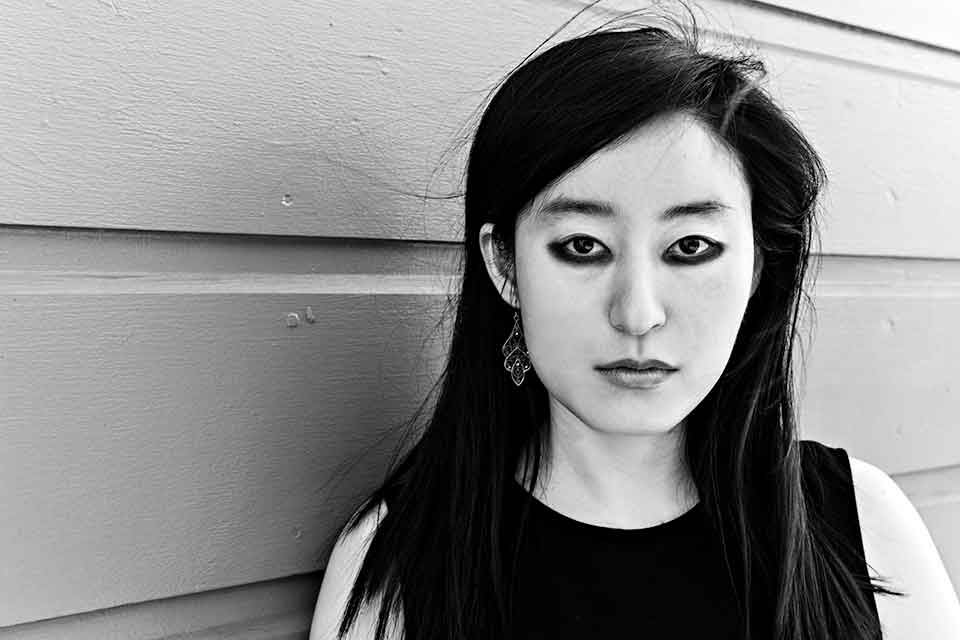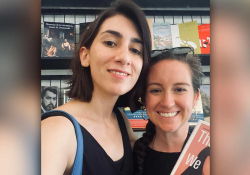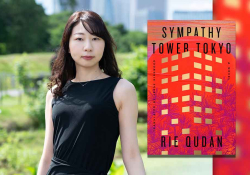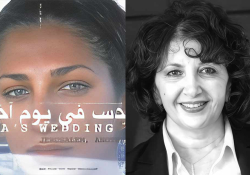On Sex, Soul Loneliness, and Walking toward Terror: A Conversation with R. O. Kwon

R. O. KWON’S work as a writer and editor explores our thorniest truths: whom we love, what we believe, and the kind of sex we want to have. I first encountered Kwon when I read her acclaimed debut novel, The Incendiaries, which is in part about loss of faith. Newly ex-Christian, I found that The Incendiaries put words to my grief like nothing else had. I’ve followed her career with eagerness since, continuing to find in her work alchemical combinations of warmth and death, connection and isolation. Recently, I had the pleasure of speaking with her about the best-selling anthology she co-edited with Garth Greenwell, Kink: Stories; the less-than-ideal state of sex in literature; and her novel-in-progress, which—spoiler alert—includes a century-old ghost.
Emily Doyle: Now that Kink has made its way in the world, I’m curious: how has its reception been surprising, challenging, or joyful? Has your own relationship to the anthology changed?
R. O. Kwon: Overall, my co-editor, Garth Greenwell, and I were really heartened by the reception, and it meant so much to hear from people who said things like, “I’ve been hungry for a book like this.”
In terms of my own relationship to the anthology, it’s hard to say because now I’m so focused on the novel that I’m working on. But there are more voices in my head because of the anthology. The fact of the voices is neither positive nor negative. It’s just a complication. When you’re working on your very first book, you’re working in relative silence.
Doyle: Kink contains a story of yours called “Safeword.” You’ve previously mentioned that you worried about what kind of reception “Safeword” would have when it was first published in Playboy. I was planning to ask if you experienced similar worries while co-editing Kink, but it almost sounds like now you’re dealing with the opposite problem. You’re dealing with knowing too much, perhaps.
Kwon: Yes, I was more anxious about “Safeword” being published than I’ve ever been about publishing a short piece. I’ve been a woman existing in the world and on the internet for a while. I know how things get. By and large, though, I got a lot of heartwarming messages from people telling me they felt less alone because of it.
But I’m always writing for my seventeen-year-old, ex-Christian self, who felt like the loneliest person alive. Writing and books have been the sturdiest bulwarks against terrible soul loneliness. I’m always working toward that. So there’s a lot of kink in the novel I’m writing. There’s a lot of queer sex. I’m already telling my parents, “For the love of God, don’t read this book.”
It’s also true—and many other people have said this—that writing toward fear, toward terror, tends to be fruitful. If nothing else, you’re not bored.
Writing toward fear, toward terror, tends to be fruitful. If nothing else, you’re not bored.
Doyle: It seems like pursuing that scary space has allowed you to remain connected to that lonely girl even as your career has taken off.
Kwon: That’s an interesting thought. You know, there’s an interview or essay with Nathan Englander where he talks about meeting Philip Roth. Englander asked—and I’m paraphrasing, which always feels like a crime with writers who are as careful with their words as Englander is—“Do I ever develop a thicker skin?” And Roth said, “Your skin will get thinner and thinner till they can hold you up to the light and see right through.”
Often, I’ll write a sentence that comes from a terrifying place, and I’ll think, Oh god, I cannot have anyone in the world believe that I believe this. And then that sentence will resonate the most with readers.
Doyle: I’m glad you’ve mentioned a fear of people associating yourself with your characters. Because I have a question that perhaps does this to you, and I want to invite you to disagree with it.
Kwon: Okay, yeah. Tell me.
Doyle: In your story “Safeword,” we occupy the perspective of Paul, an ex-Christian man struggling to find a place in the world of BDSM alongside his wife, Jihyun, who seems to yearn for more exploration in their life as a couple. Since you’ve both written about your Christian past and have helped create Kink, I wonder if parts of you are split into each character—Paul and Jihyun. Is that a fair assumption? If so, can you speak to this choice?
Kwon: I’ll put it this way: with both that story and The Incendiaries, I was really confused for a while as to why they were narrated by men, and by white men at that. I realized in retrospect that I was protecting myself. It had to do with the ongoing difficulty of conveying what it means to lose a faith. It surprises people when I say, “It was the pivotal loss,” or, “For a year afterward, I wasn’t sure that I was going to be able to go on living.” I sound hyperbolic to them. By having the ex-Christians in both those stories be men, I created distance that made it possible for me to be more truthful.
With my current novel, I’ve removed the possibility of this happening by including no significant speaking white men. I’m terrified of another white man wresting the narration away. Because I very much follow the characters, and I often feel as though I don’t quite decide what happens in a novel or story. They do.
Doyle: Did the process of losing your faith change your relationship to writing?
Kwon: It changed my relationship greatly to how I read. I was such a wild Christian that when I read Voltaire, I prayed for his soul. And I would pray for the souls of Greek philosophers and other writers. It was exhausting.
Doyle: I wonder if writing about sex, kink, and queerness creates room for fresh forms of expression—and allows you to read without praying for Voltaire.
Kwon: Well, there’s still an abiding idea that sex does not belong in capital-L Literature. Especially sex that’s the least bit detailed. I’m genuinely puzzled by that except as it relates to a moralizing point of view. Sex belongs in literature just as much as love and death and war and all the rest of it. When people are engaged in sex or thinking about or wanting sex, they’re vulnerable. Literature loves vulnerability.
When people are engaged in sex or thinking about or wanting sex, they’re vulnerable. Literature loves vulnerability.
Doyle: On the Between the Covers podcast, your co-editor Garth Greenwell said that in his novel, Cleanness, he wanted to write about sex that was “one hundred percent pornographic and one hundred percent high art.” I took this to mean that he intended to write about sex with the same literary rigor he applies to every other topic. What is it about the way sex has been approached in fiction that makes writing about it challenging?
Kwon: A standard in fiction is for the story to cut away like in a movie. There’s nothing inherently wrong with this, but it’s interesting it’s such a predominant mode when it comes to writing about sex and bodies.
You know, I love Jenny Zhang’s fiction in part because I love the way she writes about bodies. I love how she writes about bodily fluids. It’s odd that doing so is still so noticeable. I’m thinking now of a reviewer of the Pixar movie Turning Red—I forget the reviewer’s name, although I’m certain he is a man—who talked about how uninteresting the movie was to him. He wondered why it went on and on about periods.
Doyle: I remember this review.
Kwon: Right? It made me furious. I was already going to have period blood splashing around in my novel. And I just wanted more. More splashing. I was like, I want the fucking Shining of period blood. Fuck you people and all y’all’s aversion to period blood. It’s actually really cool.
I think the aversion to periods comes down to a general aversion to talk of bodies, especially bodies that are marginalized.
Doyle: I wonder how a character’s body—the way they perceive their body, or the way their body is perceived by others—affects the language a fiction writer might use to describe their sexuality or other modes of being.
Kwon: I can’t write fiction unless I know what the bodies are up to. When I’m stuck on a scene, it’s almost always the case that I need to forcibly eject myself from my own body into the character’s body. I’ll ask, “Am I hungry? Am I thirsty? Are my clothes comfortable?” These really basic questions often help me inhabit that character.
In my current novel, there’s a speaking ghost character. I got really hung up on needing to know every historical detail about her existence. Then I said to myself, “Dude, she’s a hundred-year-old ghost. What is it to inhabit a ghost body?” I realized the ghost could fly and zip around. Because of this, she has very different concerns.
And one of the main movements of the novel involves a central character becoming much more at home inside her own body. So in the prose there’s a gesture toward exuberance. Those parts were joyful to write—and agonizing, too, of course, in the way that all fiction writing tends to be agonizing. I mean, I don’t want to speak for everybody, but at least for me. I’m so wary of making absolute statements. In part because of my ex-Christian background, I live in horror of certainties.
Doyle: I’m curious: do you see your current novel as an extension of your work in Kink or The Incendiaries?
Kwon: I’ve been telling my editor that the novel I’m writing now is an extremely loose sequel to The Incendiaries in that there’s one recurring character and there’s a little talk of what happened in The Incendiaries. I suspect I’m working on what will amount to either a three- or four-part book series of extremely loosely linked books. Of course, the anthology informed some of the centering of kink that’s happening in the new novel.
Doyle: How so?
Kwon: It helped me walk further toward the fear I feel. The closer my new novel gets to being resolved, the more my anxiety increases. Sometimes I battle daily panic attacks.
You know, I’m ex-Christian. I was first raised Catholic. I’m Korean. There are just so many levels of shame to get out from that there’s actually no hope for me. So I’m just doing what I can from inside that shame. Working on Kink with Garth, and with all those wonderful writers who trusted us with their work, has helped me walk toward that terror in the hope that I’ll find warmth there.
Doyle: Do you have in your head some sort of ideal writer version of yourself?
Kwon: When I was very religious, one of my life goals was to become an isolated mystic. I loved the thought of that. There’s still a part of me that fantasizes about that kind of life. But I think what I really want is the freedom of mind that kind of life could make possible. I’d love to simply not give a fuck what anyone ever thinks about my work or my thoughts or me. Or I’d love to not give a fuck beyond the people whom I already trust and know and love. Because I also live in terror of becoming incredibly calcified and going the god-awful route of writers who have turned into TERFs, for instance. I just live in terror of being so convinced of my rightness that I’ve moved over to the side of sorrow and misery. I mean, I don’t know that they’re sorrowful and miserable, but it seems like a sorrowful and miserable place to be. Yes, I would like more freedom of mind. I would like to give less of a fuck.
October 2022
 R. O. Kwon’s nationally best-selling first novel, The Incendiaries, is being translated into seven languages and was named a best book of the year by over forty publications. Kwon and Garth Greenwell co-edited the best-selling anthology Kink, a New York Times Notable Book and recipient of the inaugural Joy Award. Kwon’s writing has appeared in the New York Times, Vanity Fair, the Guardian, and elsewhere. Born in Seoul, Kwon has lived most of her life in the United States.
R. O. Kwon’s nationally best-selling first novel, The Incendiaries, is being translated into seven languages and was named a best book of the year by over forty publications. Kwon and Garth Greenwell co-edited the best-selling anthology Kink, a New York Times Notable Book and recipient of the inaugural Joy Award. Kwon’s writing has appeared in the New York Times, Vanity Fair, the Guardian, and elsewhere. Born in Seoul, Kwon has lived most of her life in the United States.












